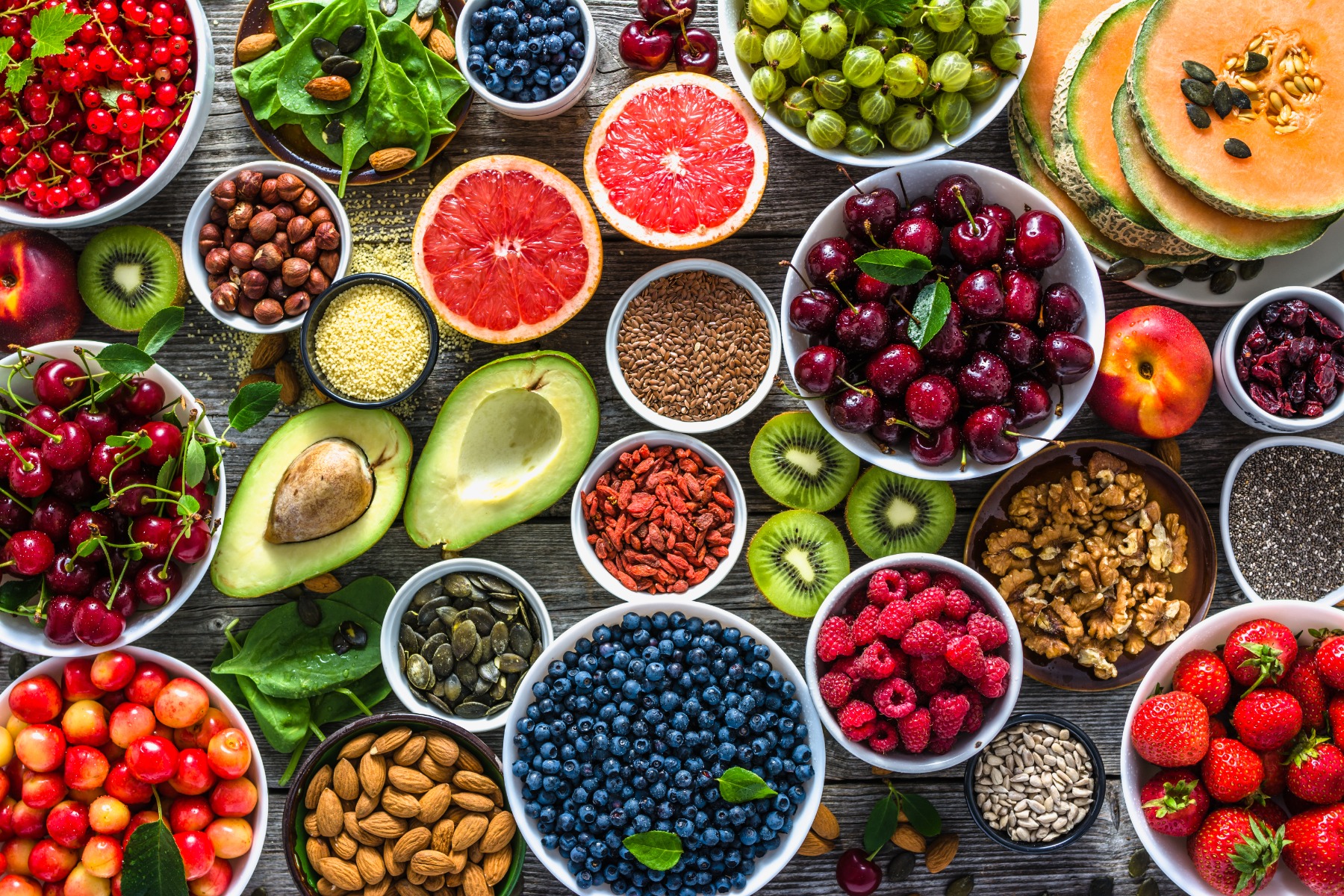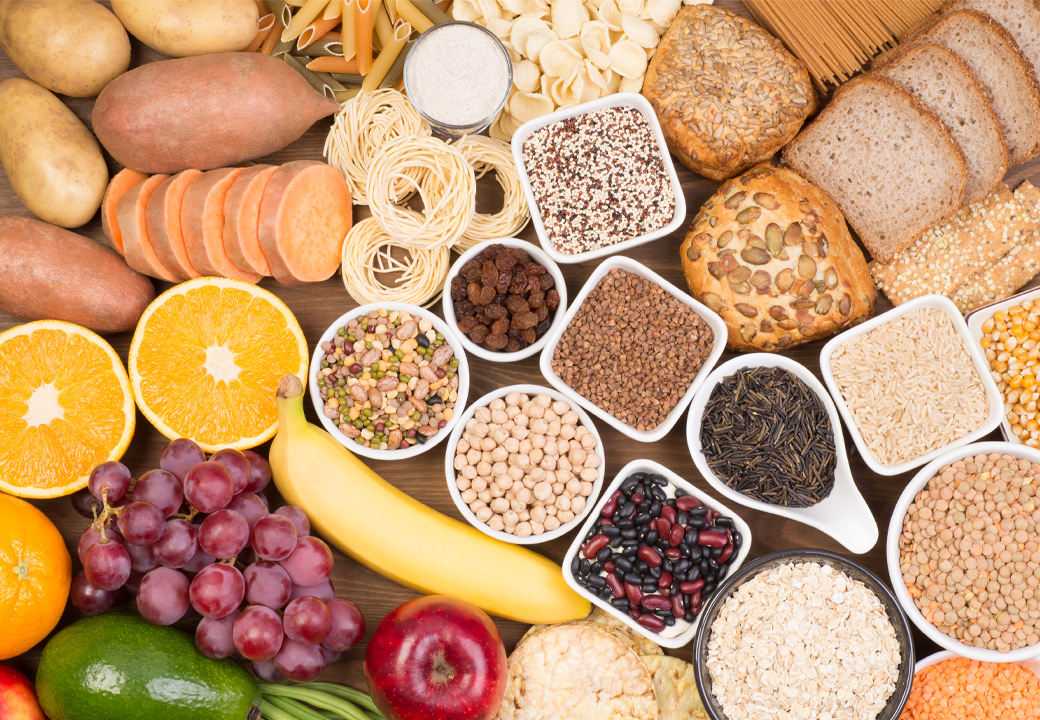
Nutrition and Hydration Week (12-18 March) is an important annual campaign which focuses on promoting awareness and encouraging people to ensure good nutrition and hydration as part of their daily diet. It is really important people maintain a good diet and stay hydrated. If you're looking at ways of improving your diet, here are a few things that could help:
- Base your meals on starchy food, it should make up around one third of the food you eat. Including: cereals and grains, pasta, rice, potatoes, nuts, seeds and legumes
- Get your 5-a-day of fruit and veg
- Eat more fish for protein and essential vitamins and minerals
- Cut down on saturated fat and sugar
- Eat less salt
- Stay active
- Be aware of dehydration - we need to drink at least 2 litres of fluid every day
Read more about the importance of nutrition and hydration on our health, the symptoms of dehydration plus the vitamins & minerals that can help.
How is nutrition linked to why we are seeing an increase in degenerative diseases such as cancers and diabetes?
Obesity and inactivity are linked to half a million cancers a year. In men, prostate cancer especially is linked to increased obesity. In women, uterine and breast cancer shows a positive correlation to those who have a high body mass index (BMI).(1)
The way that obesity drives these cancers is complex and many, but one of the reasons being the fact that fat cells produce oestrogen through an enzyme called aromatase. Oestrogen has been shown to trigger the activity of, or turn on the BCL2 gene, which when expressed at high levels causes cancer cells to grow rapidly and aggressively.(2)
Obesity rates have doubled among adults and more than tripled among children since the 1980s, due to poor nutrition and lack of physical activity. Smoking is extremely detrimental to health and can cause lung cancer as well as others too. Before smoking became popular amongst women, lung cancer was very rare in women. However, since its popularity increased in the female sex, lung cancer rates have also increased. Smoking rates are now decreasing; however, it can take several years for lung cancers to develop and therefore those that have stopped may still be at risk. In the UK, kidney cancer has more than doubled since the 1990's. The reason for this pattern is not clear, but renal cell carcinoma (a type of kidney cancer), is linked to smoking and obesity.
Type 2 diabetes is the most common type, and we are seeing an increase in children developing type 2 diabetes. Diabetes UK comments on the rise in Type 2 diabetes in children. Councils warn today that more than 600 children and teenagers are being treated for a type of diabetes normally only seen in adults aged over 40 an increase of 14 per cent in a year, which reinforces the need for urgent action on obesity due to the link between obesity and type 2 diabetes. (3) A 2009 study in The Lancet found that new cases of type 1 diabetes in children could double in the next 10 years. Unlike type 2 diabetes, which is caused by insulin resistance, type 1 diabetes is actually an autoimmune disease, in which the immune system destroys pancreatic cells that produce insulin. The disease tends to progress rather quickly and therefore needs to be diagnosed early, as it can result in serious long-term complications including blindness, kidney failure, heart disease and stroke. While type 1 diabetes is far less common than type 2, accounting for only 5-10 percent of people with diabetes, it is steadily on the rise. Rates of type 1 diabetes in children under 5 are expected to double between 2005 and 2020, and cases among children younger than 15 are expected to rise by 70 percent during this time, a Lancet study showed. What is fuelling this rise is the question on everyone's mind, and the research is pointing to one very prominent, and easily fixable, problem: vitamin D deficiency. (4)
Reasons why vitamin D deficiency has become an epidemic:
Increase in TV, internet access and video games - More indoor jobs - Fear of skin cancer, therefore increased use of SPF creams which stops vitamin D production - Obesity - Increase in soft drinks, as these use up calcium in the body which uses up vitamin D - Eating less fatty meat As well as cancer and diabetes, other degenerative disease such as Alzheimers, heart disease and Rheumatoid arthritis to name a few are also on the rise. Degenerative disease is the result of a continuous process based on degenerative cell changes, affecting tissues or organs, which will increasingly deteriorate over time, whether due to normal bodily wear or lifestyle choices such as exercise or eating habits. (5)
Why good nutrition is more important than ever before
Fruits and vegetables grown decades ago were much richer in vitamins and minerals than the varieties most of us get today. The main culprit in this disturbing nutritional trend is soil depletion: Modern intensive agricultural methods have stripped increasing amounts of nutrients from the soil in which the food we eat grows.
Sadly, each successive generation of fast-growing, pest-resistant fruit or vegetable is less good for you than the one before. A Kushi Institute analysis of nutrient data from 1975 to 1997 found that average calcium levels in 12 fresh vegetables dropped 27 percent; iron levels 37 percent; vitamin A levels 21 percent, and vitamin C levels 30 percent.
A similar study of British nutrient data from 1930 to 1980, published in the British Food Journal, found that in 20 vegetables the average calcium content had declined 19 percent; iron 22 percent; and potassium 14 percent.
Yet another study concluded that one would have to eat eight oranges today to derive the same amount of Vitamin A as our grandparents would have benefitted from one.
What can be done? The key to healthier produce is healthier soil. Alternating fields between growing seasons to give land time to restore would be one important step, but suppliers do not have time for this. Also, foregoing pesticides and fertilizers in favour of organic growing methods is good for the soil, the produce and its consumers. Those who want to get the most nutritious fruits and vegetables should buy regularly from local organic farmers. (6) Organic shopping is expensive and not an option for everyone especially those who have to feed a whole family, in which case supplementing is key for optimal health and wellbeing.
Many organic products which can support a healthy body and help to towards preventing degenerative diseases are available at The Grape Tree at an affordable price for all to benefit from. Another reason for the increased need for optimum nutrition is due to the fact that todays world contains a lot more pollution than was present 100 years ago, this coupled with a decrease in vitamins and minerals from the food that we eat means that we are at increased risk of free radical and oxidative damage which can lead to cancer and other degenerative diseases.
Supplementing with vitamins and minerals is important to counteract the damage incurred by free radicals from increased smoke, pollution, pesticides, herbicides and stress as well as insuring that you are getting the correct nutrients in your diet so that your body can function optimally. Doctors think that we get all the nutrition our body needs from eating a balanced diet. However, most of us don't eat a balanced diet, and those of us that do are not getting the same nutrient content that our great-grandparents did.
As a result, many of us are nutrient deficient. The below table summarises some of the essential vitamins and minerals that the body requires, what it does, symptoms of deficiency, dietary sources and an interesting fact!
| VITAMIN | WHAT IT DOES | SYMPTOMS OF DEFICIENCY | DIETARY SOURCES | INTERESTING FACT |
| A (retinol) | Regulates the immune system and helps to protect against bacteria and viruses | Poor vision, night blindness, dry eyes | Liver, eggs, carrots, sweet potato, spinach, broccoli | Zinc helps you absorb vitamin A |
| D (calciferol) | Helps maintain levels of calcium and phosphorus in the blood | Rickets, bone pain, cardiovascular disease, asthma | Sunshine, cod liver oil | Could help people with hearing loss |
| K | Helps the healthy functioning of the kidney, aids bone growth and repair | Osteoporosis, heavy menstrual bleeding, gum bleeding, easy bruising | Dark green leafy vegetables, green tea, cheese | For patients on warfarin, K supplements may help stabilise the blood??s clotting factor (consult doctor before taking though if on warfarin) |
| B1 (thiamine) | Improves circulation, digestion and brain function. An antioxidant that protects against the worst excesses of alcohol and smoking | Sensory symptoms, shaky hands | Brown rice, egg yolks, whole grains, nuts, broccoli | Becomes more important as you age |
| B6 (pyridoxine) | Good for morning sickness and nausea if pregnant. Keeps immune and nervous system healthy | Inability to remember dreams, carpal tunnel syndrome, sore tongue, depression | Cereals, beans, bananas, potatoes | Important if you are eating fewer calories |
| B7 (biotin) | Helps keep skin, hair and nails healthy | Hair loss, poor skin, bad nails | Cheese, organ meats, eggs, nuts, oatmeal | Long term use of antibiotics reduces levels of biotin |
| B12 | Helps maintain healthy nerve cells and blood cells | Premature greying hair, tingling and numbness in hands and feet, fatigue, constipation | Fish, meat, dairy, tempeh, supplements | Most at risk are children and babies |
| C (ascorbic acid) | The most important antioxidant, it??s vital for immune functioning. It aids tissue growth and wound healing. It??s good for stress and at high doses may fight cancer | Dry scaly skin, bleeding gums, frequent colds | Citrus fruits, berries, broccoli, sprouts, cabbage | Adding a little vitamin C to your diet, may help you live longer, it's that important |
| MINERALS | WHAT IT DOES | SYMPTOMS OF DEFICIENCY | DIETARY SOURCES | INTERESTING FACT |
| Calcium | Growth of strong bones, gums and teeth. Keeps heart healthy | Numbness in fingers, easy fractures, osteoporosis | Tofu, sardines, salmon, almonds | The average women's diet is deficient in calcium |
| Magnesium | Helps keep heart rhythm steady, maintain muscle and nerve functioning | Brittle nails, muscle cramps, high blood pressure, sensitivity to light | Green vegetables (especially spinach), seeds, magnesium flakes (bath in a cup full for 20 minutes) | You cannot get your daily requirement from any one food. |
| `Potassium | Maintains healthy blood pressure levels | Muscle pain, cramps, palpitations | Dried fruits, vegetables, nuts, coconut water | Most people are potassium deficient due to the high sodium diet |
| Selenium | Protects cells from free radical damage. Helps maintain thyroid function | Cancer or family history of cancer | Plants foods, brazil nuts, walnuts | Gastrointestinal problems such as Crohn??s prevent proper absorption of selenium |
When getting your 5-a-day it's important to understand portion size. You can find a 5-a-day portion guide on the NHS website and in a recent article we talk about getting your 5-a-day through delicious dried fruit. If the above is all too much to take in and absorb then another way of increasing your nutrient intake is by taking a daily multi vitamin.
The importance of proper hydration
60% of the human body is made up of water, that just goes to show how important it is. But what does it do for us you might be asking? Well, it has many roles, such as acting as a building block, chemical and metabolic reactions therefore needed for energy as well as weight loss, and a transport material for nutrients and waste elimination. It also plays an important role in maintaining a healthy blood pressure as well as regulating body temperature. If that is not enough, proper hydration can also help to prevent diseases and conditions such as kidney stones, constipation, asthma, urinary tract infections, heart disease and also some cancers.
Symptoms of dehydration: - Increased thirst - Dry mouth - Weakness - Dizziness - Palpitations - Confusion - Sluggishness - Inability to sweat
How much should you drink?
The recommended average is 2 litres a day but obviously this does alter depending on gender, height, weight and build so adjust up or down accordingly. If you exercise or are in a hot, humid climate then increase your intake. Avoid tap water as this contains toxins, ensure that you always drink filtered water. Typical tap water contains, chlorine, fluorine, copper, mercury, lead, hormones, nitrates and pesticides. I recommend getting a filtered water jug that you can use from at home and also at work so that you always have access to filtered water. Buy stainless steel water bottles that you can carry around with you so you always have water on the move. Stainless steel keeps it cool and is a safe material to drink from. Avoid drinking from plastic bottles as the plastic chemicals leach into the water. Coconut water is also a great option as it rehydrates you. It contains lots of electrolytes including potassium which is a mineral that many people are low in. Don't feel overwhelmed by all this advice, just take 1 or 2 tips away with you and build on them over time. Sources:
- Global burden of cancer attributable to high body-mass index in 2012: a population-based study https://www.ncbi.nlm.nih.gov/pmc/articles/PMC4314462/
- The Truth About Estrogen and Breast Cancer (+ 9 Ways to Support Hormone Health)??https://thetruthaboutcancer.com/estrogen-and-breast-cancer/
- Diabetes UK comments on rise in Type 2 diabetes in children??https://www.diabetes.org.uk/about_us/news/type-2-diabetes-in-children
- Incidence trends for childhood type 1 diabetes in Europe during 1989??2003 and predicted new cases 2005??20: a multicentre prospective registration study??http://www.thelancet.com/journals/lancet/article/PIIS0140-6736%2809%2960568-7/fulltext
- Degenerative disease from Wikipedia, the free encyclopedia??https://en.wikipedia.org/wiki/Degenerative_disease
- Dirt Poor: Have Fruits and Vegetables Become Less Nutritious???https://www.scientificamerican.com/article/soil-depletion-and-nutrition-loss/


